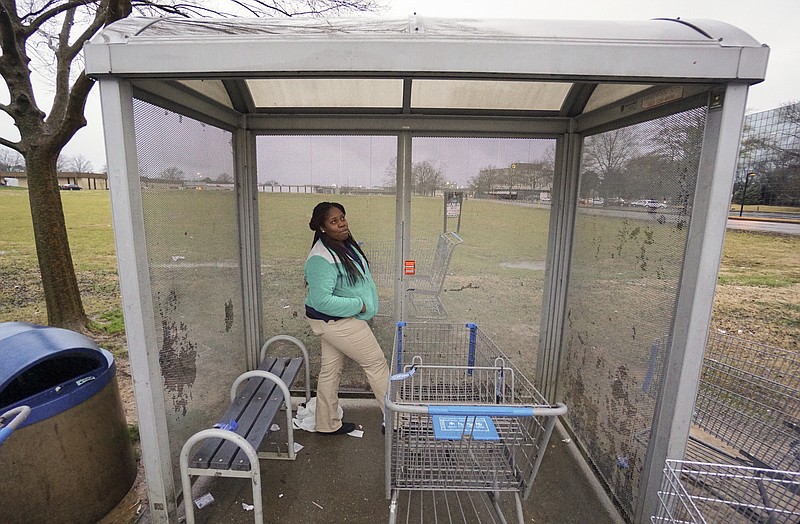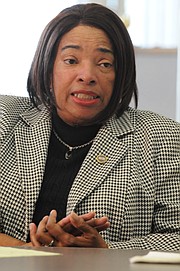The challenge for women
› 47 percent of households headed by a woman have incomes below poverty level› Half of local workers are women, but in nine of 11 job categories, they earn less than men› Nationally, women make about $74 to $76 for every $100 men make
More Info
If you are interested in working with the council, call the mayor’s office, 423-643-7800, or sign up here: http://connect.chattanooga.gov/womens-council/
Diana Bullock didn't believe what she was hearing, so she decided to check things out herself.
She got on a CARTA bus on Market Street recently and headed out to Hamilton Place mall, determined to find out just how long it would take someone to get there from downtown.
"An hour and 49 minutes," Bullock told members of the Mayor's Council on Women last week as they gathered around a table in a conference room at City Hall.
"There was a traffic issue and they had to stop at certain places for trains to go across," she said later. "There were a lot of things I wouldn't have thought about because I drive every day."
Bullock, who is vice president for economic development and government relations for EPB, is one of about 200 women on the high-powered council started by Chattanooga Mayor Andy Berke last April. The group has spent 10 months trying to figure out why women in Chattanooga do much worse economically than men. And transportation headaches, such as Bullock's problem getting to a possible job at Hamilton Place, are high on the agenda.
"We know [there] are many areas where women's incomes don't match up to men's, where responsibilities fall disproportionately on women. We wanted to have great ideas that could address those problems," Berke said. "We thought it would be a great opportunity to have women from all across our community to come together to create a tight network of people who could expand their leadership opportunities in the city."
The numbers the group unearthed for Chattanooga are depressing:
' Of households headed by a woman, 47 percent have incomes below the poverty level, according to a 36-page report prepared by the council.
' Almost half of all workers in Chattanooga are women, but they earn less than men in nine of 11 job categories. The areas where women earn almost as much as men are those that do not pay well, such as personal care or general office work.
* Nationally, women make about $75 for every $100 men make.
Many of the problems are well-known - pregnancy keeps many girls and women from pursuing education or a job; poor women can't afford cars and must depend on limited public transportation to get to school or work; and a lack of education keeps some women in the dark about options for health care or child care.
The task for the council is to figure out policy solutions for those problems.
Their first piece of legislation, to prevent women victims of domestic violence from being evicted from their homes, was introduced into the Tennessee General Assembly this week.
City Council Chairwoman Carol Berz, who co-chairs Berke's panel along with state Rep. JoAnne Favors, believes that is just a start.
The women's council recently issued its first report, proposing dozens of possible solutions to problems facing women in the city. Berz is hoping the group will begin bringing proposals to the City Council monthly.
The domestic violence legislation illustrates how the council hopes to operate.
Former Legal Aid attorney Emily O'Donnell, now with the Fund for Public Education, drafted the bill to help keep women in their homes after talking with other committee members, including General Sessions Judge Christie Sell and Lillie Wills of the Women's Fund of Greater Chattanooga.
Under Tennessee law, renters can be evicted if a crime is committed on the property. If a woman calls police to report an assault by a spouse or boyfriend, she risks losing her family's housing.
Such evictions are rare, but that's because fear of being kicked out keeps women from reporting abuse, said Rebecca Whelchel, executive director of Metropolitan Ministries. Whelchel's group often deals with the impact of domestic abuse.
"If their personal and family networks don't offer any kind of support and fear of eviction prohibits them from getting support from the police, where does that leave them?" she asked.
O'Donnell said group members met with state Rep. Gerald McCormick, a Chattanooga Republican and a landlord, to review the legislation. They pointed out it does not affect a landlord's right to evict tenants for other reasons. As House Majority Leader, McCormick is one of the most powerful members of the General Assembly, so they are hopeful the bill will pass.
Another proposal almost ready is a pilot program within the police department to help female officers learn how to become leaders in a male-dominated profession. If it works, the hope is to expand it to other government agencies and to private businesses.
EPB's Bullock said negotiations are underway to get the Tennessee Manufacturers Association involved.
"They will have some input coming to the meetings so they can work with all of their members to take back issues that manufacturers can do to move this forward," she said. "I'm really excited that the business community is open to it."
Longer-term, Berz said she hopes to recruit candidates for political office, where women are under-represented. Of 34 positions on the Hamilton County Commission, City Council, Board of Education and the county's state legislative delegation, only seven are held by women - slightly less than 21 percent.
And Berz is trying to increase the number of women on city regulatory boards by recruiting candidates and giving their resumes to council members to nominate. She distributed three resumes at a recent council meeting.
At least initially, the council's biggest impact may be in bringing together a group whose members were already working independently to improve conditions for women in the city but who now can combine their efforts.
"The value for me has been getting to work with a lot of women I didn't know very well before," said the Public Education Fund's O'Donnell. "Our working group is full of very knowledgeable, very passionate women who have some great ideas."
And all the group members agree on their common goal: As women improve their economic status, everyone benefits.
"The whole community gains an advantage," O'Donnell said, "families are stronger, children are better cared for, and we all have more economic security when women have policies that help them advance."
Contact reporter Steve Johnson at sjohnson@timesfreepress.com, 423-757-6673, on Twitter @stevejohnsonTFP or on Facebook, facebook.com/noogahealth.

